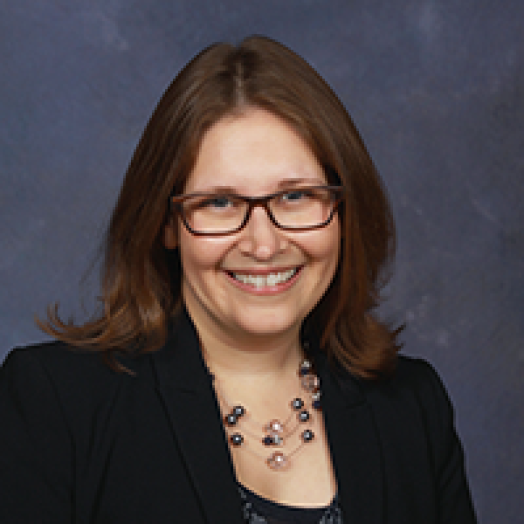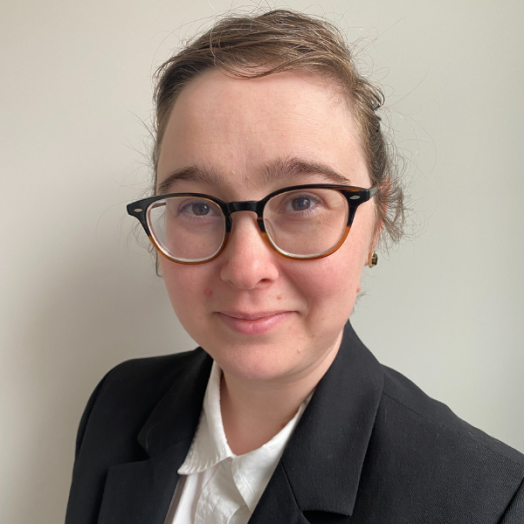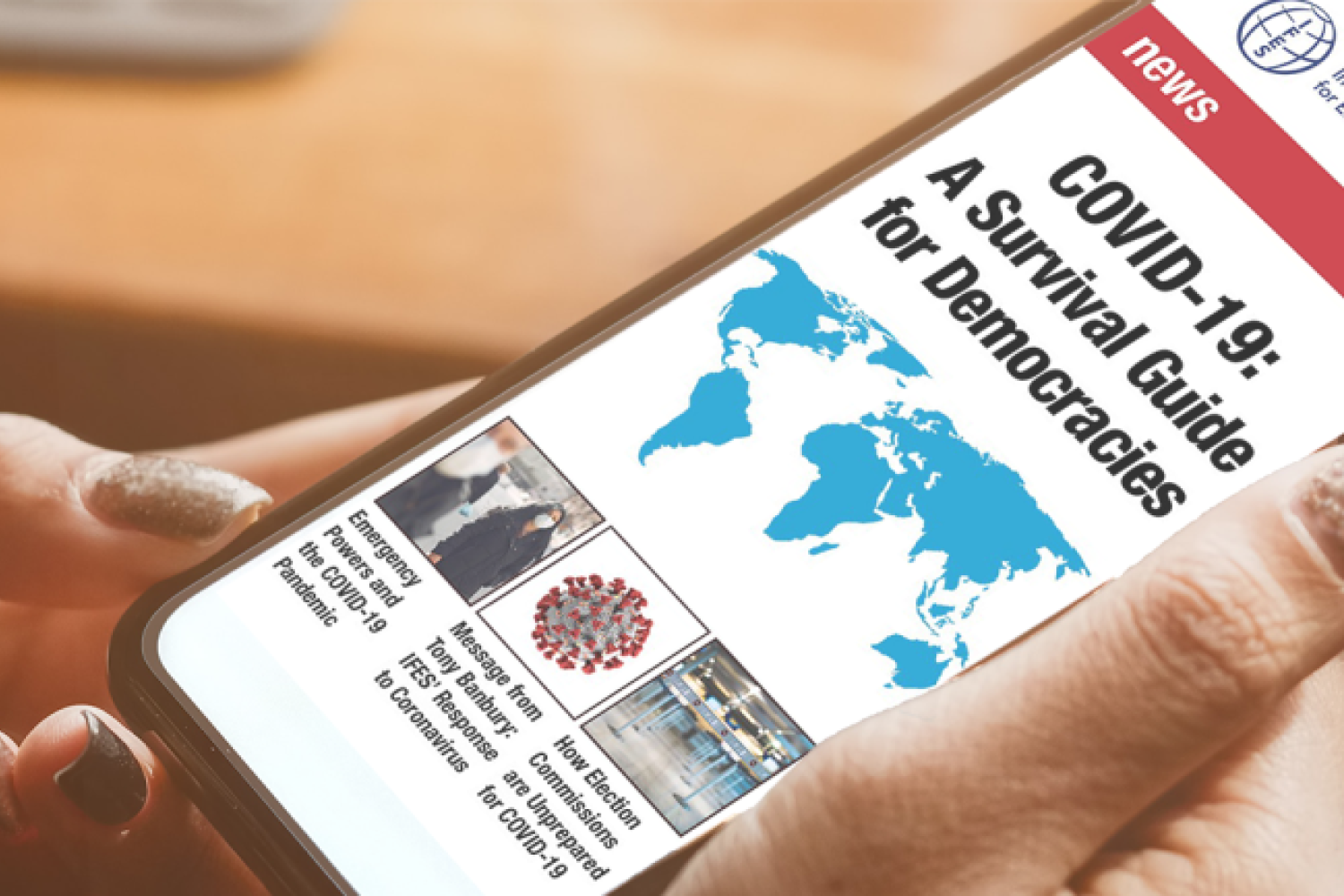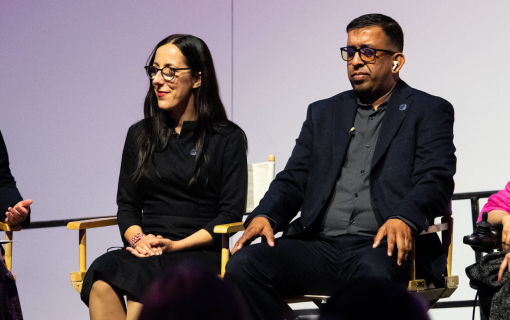
How to Ensure People with Disabilities Are Included in Political Life During COVID-19
by Virginia Atkinson and Rebecca Aaberg
Democracy works when all people have a voice in how they are governed. However, the world’s 1 billion persons with disabilities have historically been excluded from decision-making processes, including elections. Persons with disabilities, who experience discrimination and other barriers to electoral access, are at risk of having their right to participate compromised during emergencies. The COVID-19 crisis has created a unique challenge to electoral participation of persons with disabilities, who may be immunocompromised and thus at a higher risk of contracting the new coronavirus. Many older persons, who are more susceptible to COVID-19, have also acquired disabilities with age. Movement restrictions imposed by governments to stop the spread of COVID-19 have made it difficult for persons with disabilities who use personal assistants (PAs) to take part in daily activities, such as restrictions on driving personal vehicles in Georgia. Some persons with disabilities may have concerns that PAs can spread disease to them or that PAs may be unable or unwilling to provide support during the pandemic, which can limit the participation of persons with disabilities in political and public life.
International treaties and regional policy documents protect electoral participation during emergencies. The United Nations Convention on the Rights of Persons with Disabilities (CRPD) Article 29 protects the rights of all persons with disabilities to vote and to run for office. In humanitarian crises, such as pandemics, Article 11 of the CRPD obligates states to protect the safety of persons with disabilities. In Europe, for example, the Venice Commission’s Revised Interpretative Declaration to the Code of Good Practice in Electoral Matters on the Participation of People with Disabilities in Elections calls for equal access of persons with disabilities to vote and to serve as elected officials. In Southeast Asia, the ASEAN Enabling Masterplan 2025: Mainstreaming the Rights of Persons with Disabilities obligates states to protect political rights and outlines inclusion measures to be taken as part of disaster relief.
“During this time of social distancing and stay-at-home orders, people with disabilities are at the greatest risk of human rights violations, being subjected to violence and hate speech. As we are to stay at home, I’m using social media, particularly Facebook, to advocate on behalf of young people with disabilities.”
– Nayem Molla, young disability rights advocate and member of Students Against Violence Everywhere, Bangladesh
The COVID-19 crisis is also an opportunity to promote innovative measures to empower all electoral participants. Making changes such as mail-in ballots, curbside voting and advance voting permanent will expand enfranchisement for all potential voters, not only persons with disabilities, thereby promoting more democratic practices. With anticipated budget cuts in light of the COVID-19 crisis, the disability community is concerned that social care and welfare systems will be strained, resulting in limitations to government programs enabling access. Disability rights advocates must adapt their strategies to raise the profile of these issues as public events, political debates, demonstrations, audits of polling stations and election simulations are restricted.
To respond to the COVID-19 crisis, the International Foundation for Electoral Systems (IFES) has developed innovative approaches to ensure that persons with disabilities continue to have access to participate on an equal basis with their peers. IFES is developing a brief on the impacts of COVID-19 on marginalized groups. In Tunisia and Libya, IFES and Deaf advocates have created messages in sign language on the impacts of COVID-19. In Myanmar, IFES is working with Future Stars, a self-advocacy organization of persons with intellectual disabilities, to develop an easy-to-read guide on staying safe while participating in political life. To better understand the barriers faced by women and young people with disabilities to political participation during the pandemic, IFES conducted a survey with civil society in the Pacific Islands that used the Washington Group questions, which will be adapted for a broader survey in Europe. In Nigeria, IFES and the Independent National Election Commission are adapting outreach plans to focus on radio call-in shows and other remote methods accessible to persons with disabilities. In Pakistan, IFES is hosting an online version of its “Power to Persuade” training with women with disabilities to build skills to advocate with government stakeholders on COVID-19 response. IFES and Agate Rights Defense Center for Women with Disabilities in Armenia adapted IFES’ polling station audit methodology to include an online training focused on building participants’ knowledge of COVID-19 health and safety measures to ensure safe and inclusive participation in polling station audits during and after COVID-19. In Bolivia, IFES is supporting the election management body ahead of the 2020 elections to develop 21 animated training and public awareness videos of polling processes in Spanish with sign language, as well as three Indigenous languages, Quechua, Aymara and Guaraní.
Based on international good practices and programs working with persons with disabilities and their organizations in over 60 countries, IFES recommends the following:
Electoral Preparations and Staffing
- Align responses to international treaties, such as the CRPD and regional policies.
- Identify ways to work remotely as an alternative to closing offices or sections that work on disability rights.
- Plan for shipping delays on procurements of assistive devices for voting, such as magnifying sheets and tactile ballot guides.
- Ensure that remote poll worker trainings are accessible to poll workers with disabilities using text-to-speech, captioning and simple text.
- Select polling stations that are close to public transportation operating during COVID-19 shutdowns.
- If moving polling stations out of areas frequented by high-risk groups, such as residential institutions, ensure there are easily accessible alternate voting locations.
In South Korea, election officials ensured that over 99 percent of polling stations were accessible to voters with disabilities, including selecting locations on the ground floor or with a working elevator. Alternative options could include creating additional polling stations so that residents of high-risk communities can continue to vote in their location while limiting access from the outside to other voters.
Voter Registration
- Create alternatives to in-person voter registration, particularly for voters in high-risk groups, such as sending a registrar using personal protective equipment (PPE) to disabled people’s organizations, retirement communities and assisted living centers.
- Collect disability-disaggregated information using the Washington Group questions.
Voter Education
- Provide information on postponements and changing electoral arrangements in accessible formats, including audio, braille, easy-to-read and sign language. Use plain language, limiting jargon. In some countries, sign language interpreters are being included in press conferences announcing quarantine measures, but interpreters are not always present for announcements about postponed elections.
- Ensure that web-based voter education activities are accessible to all persons with disabilities.
- Use text messaging to push messages on postponements and elections where internet bandwidth or penetration is low.
- Include updated postponement information on accessible websites for persons who use screen readers, such as persons with visual or learning disabilities.
- Pair radio campaigns with visual information, such as sign language interpretation and captions during TV spots, to ensure that Deaf communities and persons who are hard-of-hearing have access to information on the changes.
In Zimbabwe, disabled people’s organizations won a court case to ensure all information on COVID-19 be made available in sign language, which provides a precedent for ensuring accessibility of future emergency government communications.
Voting Process
- Consider mail-in voting as an option for all voters, including voters from high-risk groups.
- Consider alternatives to mobile ballot boxes for voters with disabilities or older people to vote from home, such as mail-in voting. Voters with disabilities may elect to vote from home to avoid exposure. However, mobile ballot box teams should strictly follow PPE guidance as if a member of the team has the virus, which can disproportionately affect the disability community.
- Provide PPE for all poll workers, including in areas where COVID-19 is prevalent or if poll workers are in high-risk groups.
- Provide poll workers with clear masks to enable lip reading and/or live captioning services.
In Indonesia, persons with disabilities are manufacturing clear masks that enable people with hearing disabilities to read lips, which can be used by poll workers when communicating with Deaf voters. Similar innovations have been made by students in the United States.
- Provide hand sanitizer and/or hand washing stations for all voters, including voters who use tactile ballot guides since it can be difficult to read braille while wearing gloves. Similarly, social distancing will impact voters who rely on physical assistance to visit the polling station or mark their ballot. Consider creating guidelines for poll workers to assist if needed, such as allowing poll workers to wash their hands, change masks and take other precautions after assisting a voter with a disability.
- Sanitize tactile ballot guides and other assistive devices after each use.
- Include guidance in poll worker training on how to support voters with psychosocial disabilities such as PTSD who experience panic attacks or are otherwise triggered by the polling station.
Complaints
- Make online forms accessible and provide alternatives such as submitting complaints by phone.
Virginia Atkinson is a senior global inclusion advisor and Rebecca Aaberg is an inclusion specialist at IFES.
Published on July 14, 2020.













